Mostrar el registro sencillo del ítem
dc.contributor.author
Badagnani, Daniel

dc.contributor.author
Barbero, César Alberto

dc.contributor.author
Mariano, Alejandro Edgardo

dc.date.available
2018-08-03T21:55:57Z
dc.date.issued
2015-11
dc.identifier.citation
Badagnani, Daniel; Barbero, César Alberto; Mariano, Alejandro Edgardo; Consistence between πn Δ spin-3/2 gauge couplings and electromagnetic gauge invariance; IOP Publishing; Journal Of Physics G-nuclear And Particle Physics; 42; 12; 11-2015; 125001-125016
dc.identifier.issn
0305-4616
dc.identifier.uri
http://hdl.handle.net/11336/54207
dc.description.abstract
We review the consistency between the recently proposed spin-3/2 gauge interaction for Δ resonance with nucleons (N) and pions (π), and the fundamental electromagnetic gauge invariance in any radiative amplitude. We show that: (1) the electromagnetic interaction introduced through minimal substitution in all derivatives breaks the spin-3/2 gauge invariance; (2) radiative corrections (in general not zero for any effective Lagrangian theory) of the spin-3/2 gauge strong vertexes at one loop reintroduce the conventional π derivative interaction. In fact, analyzing elastic and radiative scattering amplitude, we show that chiral symmetric π-derivative couplings can be substituted through a linear transformation to get Δ-derivative ones, which have the property of decoupling the 1/2 field components of the Δ propagator, plus contact terms where the Δ-field is absent. One could intend to apply new transformations (now linear and nonlinear) to restore this property in the radiative case, but the electromagnetic gauge invariance does not survive and nonlinear transformations generate an infinite number of Δ-field terms in the Lagrangian. We conclude that we can only content ourselves to fulfil approximately the electromagnetic gauge invariance at a given order n without destroying the spin-3/2 one, by dropping n + 1 order terms within an effective field theory framework, where the 'order n' is defined as a power counting expansion applicable only in the resonance region. In addition, we show that the Ward identity for the vertex cannot be fulfilled with a trimmed 3/2 propagator - added ad hoc by some authors with the intention of avoiding 1/2 propagation in the radiative case for the amplitude.
dc.format
application/pdf
dc.language.iso
eng
dc.publisher
IOP Publishing

dc.rights
info:eu-repo/semantics/openAccess
dc.rights.uri
https://creativecommons.org/licenses/by-nc-nd/2.5/ar/
dc.subject
Delta
dc.subject
Gauge
dc.subject
Nucleon
dc.subject
Pion
dc.subject.classification
Astronomía

dc.subject.classification
Ciencias Físicas

dc.subject.classification
CIENCIAS NATURALES Y EXACTAS

dc.title
Consistence between πn Δ spin-3/2 gauge couplings and electromagnetic gauge invariance
dc.type
info:eu-repo/semantics/article
dc.type
info:ar-repo/semantics/artículo
dc.type
info:eu-repo/semantics/publishedVersion
dc.date.updated
2018-07-31T17:19:20Z
dc.identifier.eissn
0954-3899
dc.journal.volume
42
dc.journal.number
12
dc.journal.pagination
125001-125016
dc.journal.pais
Reino Unido

dc.journal.ciudad
Londres
dc.description.fil
Fil: Badagnani, Daniel. Consejo Nacional de Investigaciones Científicas y Técnicas. Centro Científico Tecnológico Conicet - La Plata. Instituto de Física La Plata. Universidad Nacional de La Plata. Facultad de Ciencias Exactas. Instituto de Física La Plata; Argentina
dc.description.fil
Fil: Barbero, César Alberto. Consejo Nacional de Investigaciones Científicas y Técnicas. Centro Científico Tecnológico Conicet - La Plata. Instituto de Física La Plata. Universidad Nacional de La Plata. Facultad de Ciencias Exactas. Instituto de Física La Plata; Argentina
dc.description.fil
Fil: Mariano, Alejandro Edgardo. Consejo Nacional de Investigaciones Científicas y Técnicas. Centro Científico Tecnológico Conicet - La Plata. Instituto de Física La Plata. Universidad Nacional de La Plata. Facultad de Ciencias Exactas. Instituto de Física La Plata; Argentina
dc.journal.title
Journal Of Physics G-nuclear And Particle Physics

dc.relation.alternativeid
info:eu-repo/semantics/altIdentifier/url/http://iopscience.iop.org/article/10.1088/0954-3899/42/12/125001
dc.relation.alternativeid
info:eu-repo/semantics/altIdentifier/doi/https://doi.org/10.1088/0954-3899/42/12/125001
dc.relation.alternativeid
info:eu-repo/semantics/altIdentifier/url/https://arxiv.org/abs/1503.01612
Archivos asociados
